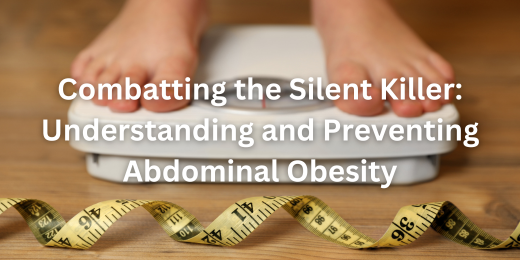
Combatting the Silent Killer: Understanding and Preventing Abdominal Obesity
Abdominal obesity
Understanding Abdominal Obesity and Its Risks
To combat abdominal obesity and its associated health risks, adopting a healthy lifestyle is crucial. The primary cause of abdominal obesity is an imbalance between calorie intake and energy expenditure, which can be exacerbated by low physical activity and poor diet. This condition increases the risk of severe health issues like diabetes, heart disease, and fatty liver, which are prevalent in India.
Addressing abdominal obesity involves both dietary changes and regular physical exercise. Processed foods, sugary drinks, and unhealthy fats are key contributors to fat accumulation in the abdominal area. A diet rich in whole grains, vegetables, and fruits can significantly reduce the risk of weight gain and improve overall metabolic health. Encouraging active lifestyles, such as daily walking or engaging in sports, helps burn calories and reduces abdominal fat
Preventing and managing abdominal obesity requires a sustained effort to reduce sedentary habits and adopt healthier eating patterns. Incorporating physical activity into daily routines, coupled with proper nutritional choices, forms the foundation of an effective strategy to manage weight. Such changes can help avoid the long-term health complications of abdominal obesity.
The Role of Body Mass Index (BMI) in Assessing Obesity
Abdominal obesity is a growing concern, often referred to as the “silent killer.” It occurs when excess fat accumulates around the abdomen, increasing the risk of several chronic diseases. Understanding its impact is crucial for adopting strategies to maintain a healthy lifestyle and prevent serious health complications.
Body Mass Index (BMI) is commonly used to assess obesity, though it has limitations. A BMI of 23–27.5 kg/m² indicates overweight, while above 27.5 kg/m² signals obesity. However, BMI does not account for fat distribution, making waist circumference an important indicator, especially for abdominal obesity.
Both body mass index (BMI) and waist measurement should be taken into consideration when conducting a full health examination. Combining these can provide a better understanding of an individual’s health risks. To combat abdominal obesity, adopting a balanced healthy lifestyle that includes regular exercise and proper nutrition is essential for maintaining overall well-being.
Key Dietary Guidelines to Prevent Obesity
Abdominal obesity is a serious health risk linked to several chronic conditions. Preventing it begins with making healthier dietary choices. A healthy lifestyle involves including whole grains, vegetables, pulses, and lean proteins in meals while limiting processed foods and sugary drinks.
Portion control is another crucial factor in preventing obesity. Monitoring meal sizes helps avoid overeating, which can contribute to excess fat around the abdomen. Consuming balanced portions supports maintaining a healthy lifestyle and reduces the likelihood of developing abdominal obesity over time.
Micronutrients and fibre play an important role in managing weight. Foods rich in vitamins, minerals, and fibre help increase satiety, supporting weight management. A diet with these nutrients enhances metabolic health, preventing abdominal obesity and promoting overall well-being. Making these dietary adjustments is key to leading a healthier life.
Significance of Physical Activity in Weight Management
Abdominal obesity is a growing concern due to its link to serious health risks. Regular physical activity plays a key role in preventing and managing abdominal fat. Engaging in a healthy lifestyle through exercises like walking, yoga, and strength training helps maintain a healthy weight and metabolism.
Physical activity also helps boost metabolism by preserving muscle mass, which is essential for weight management. Strength exercises and aerobic activities improve the body’s ability to burn calories. Consistently incorporating these activities into daily life supports the prevention of abdominal obesity and improves overall health.
It is important to aim for gradual weight loss to ensure sustainable results. Aiming for a reduction of 0.5 kg per week is a healthy approach. This method promotes long-term weight management while avoiding extreme calorie restrictions, making it easier to maintain a healthy lifestyle over time.
Health Consequences of Abdominal and Overall Obesity
Abdominal obesity has serious health consequences, impacting both physical and mental well-being. Excess fat triggers chronic inflammation, weakening the immune system and overall health. Adopting a healthy lifestyle can help reduce inflammation and protect against the harmful effects of abdominal obesity.
Excessive fat, especially around the abdomen, increases cardiovascular risks. It raises bad cholesterol (LDL) and triglyceride levels, contributing to hypertension and coronary artery disease. Managing weight through diet and physical activity is crucial to prevent abdominal obesity and protect heart health.
Not only does obesity have an effect on one’s physical health, but it also has an effect on one’s mental well-being. Abdominal obesity can lower self-esteem and contribute to social challenges. A healthy lifestyle helps improve both mental and physical health, providing a holistic approach to combat the effects of obesity.
Practical Tips for a Balanced Lifestyle
A healthy lifestyle starts with planning balanced meals that include a variety of vegetables and whole grains. These foods provide the energy and nutrients needed for daily activities while supporting overall health. Meal planning helps reduce the risk of abdominal obesity by promoting healthier eating habits and portion control.
Healthy cooking methods, such as grilling, baking, or steaming, are key to reducing calorie intake. These techniques preserve the nutritional value of foods while lowering fat content. By avoiding frying, individuals can better manage weight and prevent abdominal obesity, leading to improved long-term health outcomes.
Smart snacking plays an important role in maintaining a balanced lifestyle. Choose nutrient-dense snacks like nuts, yoghurt, or fresh fruits rather than processed options. These snacks are not only satisfying but also support weight management and reduce the risk of abdominal obesity. Consistent healthy choices create lasting positive habits.
To buy premium Uyir Organic food products and eco-friendly fertilizers, visit your closest Uyir Organic Farmers Market or shop online at www.uyironline.in or www.uyirorganic.farm.